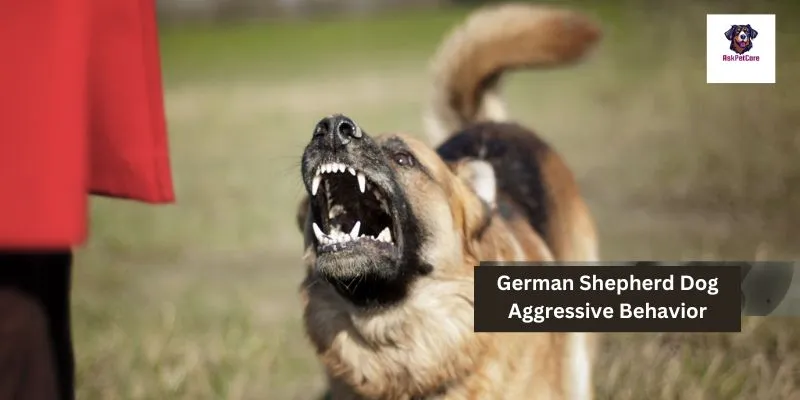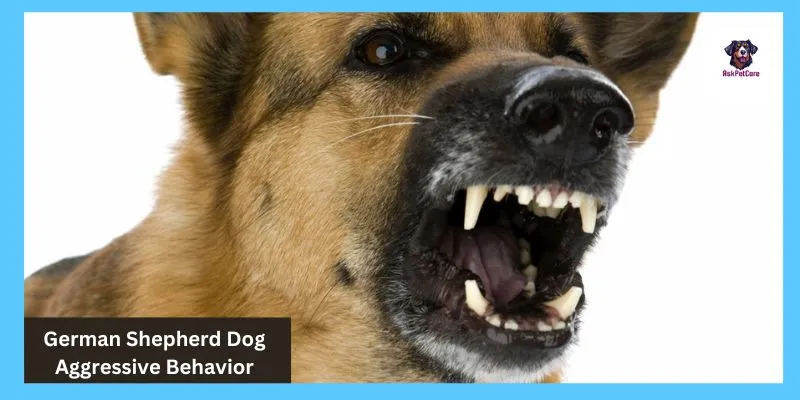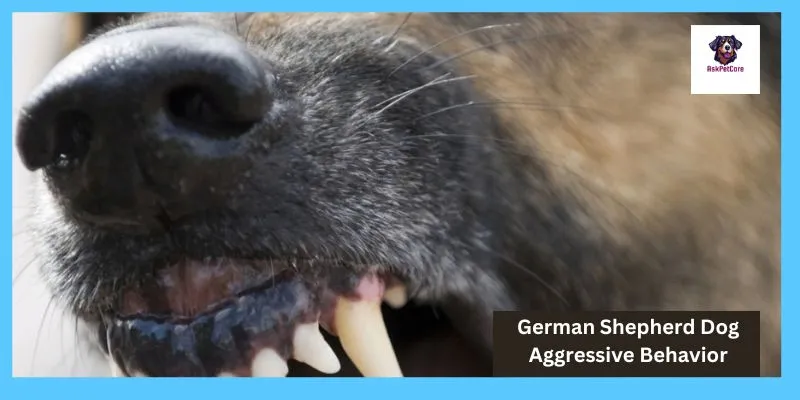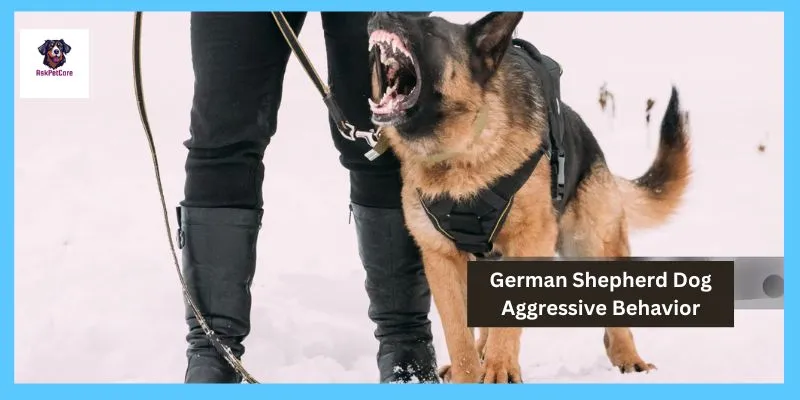Understanding Aggressive Behavior in German Shepherd Dogs: Causes and Solutions
Hello shepherd lovers, today I will explain in detail about German Shepherd Dog Aggressive Behavior.
German Shepherds are smart, loyal dogs that can do lots of jobs. But sometimes, they might act aggressively, which can be terrifying and unsafe. It’s really important to deal with this behavior for a few reasons. First, aggression can be dangerous for people and other animals. Second, it might cause legal problems for you. And third, it can make life hard for both you and your dog.

In this blog, we’re here to help you fix aggressive behavior in your German Shepherd. Whether it’s happening sometimes or all the time, we’ve got tips to make things better. We’ll explain why dogs get aggressive and give you practical advice to train them. Our goal is to help you and your furry friend have a happy and safe relationship. Let’s get started on this journey together.
Hello everyone who loves dogs! I’m Dr. Arif Aziz, and I’ve been taking care of pets especially dogs at my clinic for a long time, exactly 14 years! I’m here to share some valuable information with you that I’ve gathered from books during my study time written by experts in veterinary medicine (DVM) and MSC (Master of Science), as well as from my own experiences working with dogs.
Firstly Recognizing what is Aggressive Behavior:
When your German shepherd is feeling aggressive, they might show it in different ways. Some signs to watch out for include growling, snarling, or showing their teeth. These are signs that your dog is feeling upset or ready to defend themselves.
It’s also important to understand that there are different reasons why a dog might act aggressively. For example, they might be scared of something, like a loud noise or a stranger. This is called fear-based aggression. Or, they might feel like they need to protect their territory, like their home or their toys. This is called territorial aggression.
Early detection of aggressive behavior is really important. The sooner you notice it and start working on it, the easier it will be to fix. If you ignore it or hope it will go away on its own, it could get worse over time. So, it’s best to take action as soon as you notice any signs of aggression in your German Shepherd.

Now Understands Signs Of Aggression In German Shepherds.
Here are ten signs of aggression in German Shepherds:
- Growling: If your German Shepherd is growling, it’s a clear sign that they are feeling threatened or upset about something.
- Baring teeth: When a German Shepherd bares their teeth, it’s a warning sign that they are ready to defend themselves if necessary.
- Snarling: Similar to growling, snarling is another vocalization that indicates aggression or discomfort.
- Stiff body language: If your dog’s body is tense and stiff, with their muscles visibly tensed, it could indicate aggression.
- Raised hackles: The hair along a German Shepherd’s back might stand up when they’re feeling aggressive, making them look larger and more intimidating.
- Lunging: If your dog suddenly moves forward aggressively, attempting to bite or attack, it’s a clear sign of aggression.
- Intense staring: Direct, prolonged eye contact can be a sign of aggression in dogs, including German Shepherds.
- Raised tail with rigid wagging: While wagging is often associated with happiness, a stiff or rigid wagging tail accompanied by raised hackles can indicate aggression.
- Snapping: If your German Shepherd snaps or tries to bite, it’s a serious sign of aggression that should not be ignored.
- Aggressive posturing: This includes standing tall, ears erect, and possibly leaning forward, signaling readiness to defend or attack.
These signs can vary in intensity and may occur in different combinations. It’s essential to pay attention to your German Shepherd’s body language and behavior to identify signs of aggression early on and address them appropriately.

Now understand the types of aggression in German Shepherds:
Here are ten types of aggression that may manifest in German Shepherds:
- Fear-based aggression: This occurs when a German Shepherd feels threatened or scared, leading them to act aggressively to protect themselves or escape the perceived threat.
- Territorial aggression: German Shepherds are naturally protective of their home and surroundings. Territorial aggression may occur when they perceive an intruder or threat to their territory.
- Protective aggression: Similar to territorial aggression, protective aggression occurs when a German Shepherd perceives a threat to their family members or belongings and reacts aggressively to defend them.
- Possessive aggression: German Shepherds may exhibit possessive aggression when they guard their food, toys, or other resources from perceived threats or competition.
- Dominance aggression: Some German Shepherds may display dominance aggression when they attempt to assert control or establish their position within a hierarchy, often by displaying aggressive behaviors toward other animals or people.
- Redirected aggression: This occurs when a German Shepherd redirects their aggression from the original target to another target that is nearby or more accessible, often due to frustration or excitement.
- Predatory aggression: German Shepherds have a strong prey drive, which can lead to predatory aggression when they chase, capture, or even harm smaller animals or objects that trigger their hunting instincts.
- Social aggression: This type of aggression occurs during social interactions with other dogs or unfamiliar people, often stemming from fear, insecurity, or lack of socialization.
- Pain-induced aggression: When a German Shepherd is in pain or discomfort, they may react aggressively as a defensive mechanism to protect themselves from further harm or discomfort.
- Maternal aggression: Female German Shepherds may exhibit maternal aggression when they feel threatened or perceive a potential threat to their puppies, displaying protective behaviors to ensure the safety of their offspring.
It’s important to recognize the underlying causes of aggression in German Shepherds to address them effectively through appropriate training, socialization, and management techniques.

Now Understand the Causes of Aggression in German Shepherds:
Environmental Factors: Upbringing, socialization, and training play significant roles in shaping a German Shepherd’s behavior. How a dog is raised and the experiences they have during their formative months can greatly influence their temperament and responses to various stimuli. Proper socialization—exposing the dog to different people, animals, environments, and situations in a positive way—is crucial for preventing fear-based aggression and promoting confidence and adaptability.
Genetic Traits: Like people inherit traits from their parents, German Shepherds also get some behavior traits from their ancestors. Some dogs might tend to be more protective or assertive because of their family history.
Upbringing and Training: How a dog is raised and trained has a big impact on how they behave. If they’re introduced to lots of different things in a positive way when they’re young, they’re more likely to be confident and friendly. But if they’re not socialized well or trained properly, they might develop fear or aggression issues.
Health Problems: Sometimes, aggressive behavior in German Shepherds can be because they’re in pain or feeling sick. Just like people, dogs can get irritable when they don’t feel good. It’s important to check with a vet to make sure no medical issues are causing the aggression.

Now understand how to Addressing Aggression through Training:
- Positive Reinforcement Techniques: Positive reinforcement involves rewarding desired behaviors with treats, praise, or toys to encourage their repetition. When addressing aggression in German Shepherds, positive reinforcement techniques focus on promoting calm and non-aggressive behaviors. For example, rewarding the dog for remaining calm in the presence of a trigger or responding to commands such as “sit” or “stay” instead of reacting aggressively.
- Importance of Consistency, Patience, and Professional Guidance: Consistency is key when training a German Shepherd to overcome aggression. All family members need to be on the same page and enforce consistent rules and boundaries. Patience is also crucial, as changing behavior takes time and persistence. Seeking professional guidance from a certified dog trainer or behaviorist can provide valuable insights and tailored strategies for addressing aggression effectively.
- Specific Training Exercises to Redirect Aggressive Tendencies: Several training exercises can help redirect aggressive tendencies in German Shepherds:
- Desensitization and Counterconditioning: Gradually expose the dog to triggers that provoke aggression while pairing them with positive experiences, such as treats or play, to change their emotional response.
- Obedience Training: Teaching basic commands like “sit,” “stay,” and “leave it” can help you gain control over your dog’s behavior in potentially triggering situations.
- Focus and Attention Exercises: Teaching your German Shepherd to focus on you or a specific command can help redirect their attention away from potential triggers.
- Controlled Socialization: Gradually introduce your dog to other dogs or people in a controlled environment, using positive reinforcement to reward calm behavior.
- Management Techniques: Implementing management strategies, such as using a muzzle or leash in situations where aggression may occur, to prevent escalation while working on behavior modification.

Now Understands How Environmental Management Reduce Aggression:
- Make Home a Safe Haven: Ensure your German Shepherd has a cozy spot to relax without any loud noises or disturbances. Provide them with their own space where they can feel secure.
- Avoid Things That Upset Them: Figure out what makes your dog aggressive and try to avoid those situations. For example, if they don’t like other dogs, try walking them in quieter areas where they’re less likely to run into other pups.
- Keep Them Busy: German Shepherds are smart and active, so they need lots of mental and physical exercise. Take them for walks, play games with them, and give them toys that challenge their brains. This helps prevent boredom and keeps them happy and healthy.
Why is my German Shepherd so aggressive?
Your German Shepherd may be showing signs of aggression for various reasons. Let’s break down some of the common factors:
- Genetics: Like humans who inherit certain traits from their parents, dogs also inherit characteristics from their ancestors. Some German Shepherds may have a genetic predisposition towards aggression due to their breeding history. For example, dogs bred for protection or guarding roles may have a stronger tendency towards assertive or defensive behaviors.
- Upbringing and Environment: The way your German shepherd was raised and the environment they were exposed to during their formative months can significantly impact their behavior. If a dog lacks proper socialization or training, or if they’ve had negative experiences in the past, they may develop aggression as a coping mechanism.
- Fear or Anxiety: Aggression in German Shepherds can often stem from fear or anxiety. If your dog feels threatened or insecure in certain situations, they may react aggressively as a way to protect themselves or communicate their discomfort. This can be especially common in dogs that have not been adequately socialized or have experienced trauma.
- Medical Issues: Sometimes, aggression in German Shepherds can be linked to underlying medical problems. Pain, illness, or discomfort can cause a dog to act out aggressively as a way to defend them or alleviate their distress. It’s essential to rule out any potential medical issues by consulting with a veterinarian.
- Lack of Leadership or Boundaries: Dogs, including German Shepherds, thrive in environments where they feel secure and know their place within the family hierarchy. If a dog lacks clear leadership from their owner or consistent boundaries, it may become confused or insecure, leading to behavioral issues such as aggression.
- Hormonal Changes: Unaltered male dogs, in particular, may display aggression due to hormonal changes such as testosterone levels. Neutering can sometimes help reduce aggressive behaviors in male dogs, although it’s not a guaranteed solution for all cases.

- Lack of Socialization: Proper socialization is crucial for German Shepherds to learn how to interact with other dogs, animals, and people in a positive and non-threatening manner. Without adequate socialization during puppyhood, dogs may develop fear-based aggression towards unfamiliar stimuli or situations.
- Resource Guarding: Some German Shepherds exhibit aggression when they feel their possessions, such as food, toys, or territory, is being threatened. This behavior, known as resource guarding, can manifest as growling, snapping, or biting to protect their valued resources from perceived threats.
- Stress or Overstimulation: Dogs, like humans, can become stressed or overwhelmed in certain environments or situations. If a German Shepherd is exposed to excessive noise, crowds, or other stressors without the opportunity to retreat and decompress, they may resort to aggression as a way to cope with their discomfort.
- Learned Behavior: Dogs are observant animals that can pick up on cues from their environment, including the behavior of other dogs or people. If a German Shepherd witnesses aggression or is inadvertently rewarded for aggressive behavior, such as by receiving attention or food, they may learn to repeat these actions in similar circumstances.
Understanding these additional factors contributing to your German Shepherd’s aggression can help you address the behavior more effectively. By addressing any underlying issues and implementing appropriate training and management techniques, you can work towards fostering a calmer and well-adjusted canine companion.
Here’s a table summarizing the reasons why your German Shepherd may be displaying aggression:
| Reason | Description |
| Genetics | German Shepherds may inherit aggressive tendencies from their ancestors, especially if bred for protection or guarding roles. |
| Upbringing and Environment | The way your dog was raised and the environment they were exposed to can influence their behavior. Lack of socialization or negative experiences can contribute to aggression. |
| Fear or Anxiety | Aggression in response to fear or anxiety is common in German Shepherds. They may feel threatened or insecure in certain situations, leading to defensive behaviors. |
| Medical Issues | Underlying medical problems such as pain or illness can cause aggression as a defensive response or attempt to alleviate discomfort. |
| Lack of Leadership or Boundaries | Dogs need clear leadership and consistent boundaries to feel secure. Without these, they may become confused or insecure, leading to aggression. |
| Hormonal Changes | Unaltered male dogs, in particular, may display aggression due to hormonal changes such as testosterone levels. Neutering can sometimes help reduce aggressive behaviors. |
| Lack of Socialization | Proper socialization during puppyhood is crucial for dogs to learn how to interact positively with others. Without it, they may develop fear-based aggression towards unfamiliar stimuli. |
| Resource Guarding | Some German Shepherds may exhibit aggression when they feel their possessions, such as food or toys, are being threatened. This behavior, known as resource guarding, is a defensive response. |
| Stress or Overstimulation | Dogs can become stressed or overwhelmed in certain environments or situations, leading to aggression as a coping mechanism. Providing opportunities to decompress is important. |
| Learned Behavior | Dogs may learn aggressive behaviors from their environment, including the behavior of other dogs or people. Inadvertent reinforcement of aggression can also contribute to learned behavior. |
Understanding these reasons can help you identify the underlying cause of your German Shepherd’s aggression and take appropriate steps to address it.

Now understand 5 ways to resolve an aggressive situation.
Here are five ways to resolve aggressive situations involving your German Shepherd:
- Stay Calm and Avoid Aggravation: Remaining calm is crucial when dealing with an aggressive dog. Avoid yelling, making sudden movements, or acting aggressively yourself, as this can escalate the situation. Keep a calm and assertive demeanor to help defuse tension and prevent further aggression.
- Create Distance and Safety: If your German Shepherd is displaying aggressive behavior, create distance between them and whatever is triggering the aggression. Move yourself and others out of harm’s way and use barriers, such as doors or furniture, to separate the dog from potential threats. This ensures everyone’s safety while you assess the situation.
- Redirect Attention: Redirecting your dog’s attention away from the trigger of their aggression can help de-escalate the situation. Use distraction techniques such as offering treats, engaging in a training exercise, or redirecting their focus to a favorite toy or activity. This shifts their focus away from the source of their agitation and helps calm them down.
- Implement Training and Management Techniques: Work on training exercises to address the underlying causes of your German Shepherd’s aggression. This may include obedience training, desensitization, and counterconditioning, and teaching alternative behaviors to replace aggressive responses. Additionally, implement management techniques such as using a leash or muzzle in situations where aggression may occur to prevent potential harm.
- Seek Professional Help: If your German Shepherd’s aggression persists or escalates despite your efforts, seek assistance from a professional dog trainer or behaviorist. They can assess the situation, identify the root causes of the aggression, and develop a customized behavior modification plan to address it effectively. Professional guidance ensures that you’re using the most appropriate techniques and strategies to resolve the aggression and promote a harmonious relationship with your dog.
By following these approaches, you can effectively manage and resolve aggressive situations involving your German Shepherd, ensuring the safety and well-being of both your dog and those around them.
Here’s a table summarizing the five ways to resolve aggressive situations involving your German shepherd:
| Approach | Description |
| Stay Calm and Avoid Aggravation | Remaining calm and composed helps prevent the escalation of the situation. Avoid yelling or acting aggressively, as this can make the dog more agitated. |
| Create Distance and Safety | Move yourself and others out of harm’s way and use barriers to separate the dog from potential triggers. This ensures safety while assessing the situation. |
| Redirect Attention | Use distraction techniques such as offering treats or engaging in a training exercise to shift the dog’s focus away from the trigger of their aggression. |
| Implement Training and Management | Work on training exercises and use management techniques such as leash or muzzle to prevent aggressive behavior. Seek professional help if needed. |
| Seek Professional Help | Consult with a professional dog trainer or behaviorist for personalized assistance in assessing and addressing the root causes of the aggression effectively. |
By employing these approaches, you can effectively manage and resolve aggressive situations involving your German Shepherd, promoting a safer and more harmonious environment for both you and your dog.

How do you stop aggressive behavior?
Here are ten methods to help stop aggressive behavior in your German Shepherd:
- Positive Reinforcement Training: Use positive reinforcement techniques to reward calm and non-aggressive behaviors. For example, reward your dog with treats or praise when they remain calm in situations that typically trigger aggression.
- Consistent Leadership: Establish yourself as the leader in your dog’s eyes by setting consistent rules, boundaries, and expectations. Dogs feel more secure when they know their place in the hierarchy, which can help reduce aggression.
- Socialization: Introduce your German Shepherd to various people, animals, environments, and experiences in a positive and controlled manner. Proper socialization helps prevent fear-based aggression and promotes confidence and adaptability.
- Obedience Training: Teach your dog basic obedience commands such as “sit,” “stay,” and “leave it.” These commands provide you with better control over your dog’s behavior and can be used to redirect their focus in potentially triggering situations.
- Desensitization and Counterconditioning: Gradually expose your dog to the triggers of their aggression while pairing them with positive experiences, such as treats or play. Over time, this helps change their emotional response to the trigger from negative to positive.
- Exercise and Mental Stimulation: Ensure your German Shepherd receives plenty of physical exercise and mental stimulation to prevent boredom and excess energy, which can contribute to aggression. Engage them in activities such as walks, runs, puzzles, and training sessions.
- Management Techniques: Use management tools such as leashes, muzzles, and baby gates to prevent your dog from engaging in aggressive behavior in situations where it may occur. This provides safety while you work on addressing the underlying causes of aggression.
- Avoid Punishment: Avoid using punishment-based techniques such as yelling, hitting, or physical corrections to address aggressive behavior. Punishment can escalate aggression and damage the trust between you and your dog.
- Seek Professional Help: Consult with a certified dog trainer or behaviorist for personalized guidance and support in addressing your German Shepherd’s aggression. They can assess the situation and develop a tailored behavior modification plan to effectively address the aggression.
- Patience and Persistence: Changing behavior takes time and consistency. Be patient and persistent in your efforts to address your dog’s aggression, and celebrate small victories along the way. With dedication and the right approach, you can help your German Shepherd overcome their aggressive tendencies and build a positive relationship based on trust and respect.
Here’s a table summarizing the ten methods to stop aggressive behavior in your German Shepherd:
| Method | Description |
| Positive Reinforcement Training | Rewarding calm and non-aggressive behaviors with treats or praise to encourage their repetition. |
| Consistent Leadership | Establishing yourself as the leader through consistent rules and boundaries to promote security. |
| Socialization | Introducing your dog to various people, animals, and environments in a positive and controlled manner. |
| Obedience Training | Teach basic commands like “sit” and “stay” to gain better control over your dog’s behavior. |
| Desensitization and Counterconditioning | Gradually expose your dog to triggers while pairing them with positive experiences. |
| Exercise and Mental Stimulation | Providing plenty of physical exercise and mental stimulation to prevent boredom and excess energy. |
| Management Techniques | Using tools like leashes and muzzles to prevent aggressive behavior while addressing underlying causes. |
| Avoid Punishment | Refraining from using punishment-based techniques, as can escalate aggression and damage trust. |
| Seek Professional Help | Consulting with a certified dog trainer or behaviorist for personalized guidance and support. |
| Patience and Persistence | Being patient and consistent in efforts to address aggression, celebrating small victories along the way. |
By utilizing these methods consistently and patiently, you can effectively address and manage aggressive behavior in your German shepherd, fostering a safer and more harmonious relationship.

I hope you will thoroughly understand aggression, its signs, causes, and treatment.if still have any quarry contact me.
Here are some reference books that are considered authoritative on the topic of dog care, including nail care:
- “The Complete Dog Owner’s Manual” by Dr. Bruce Fogle
- “The Ultimate Guide to Dog Care: Everything You Need to Know to Keep Your Dog Happy and Healthy” by Amy Marder and Andrew Luescher
- “The Veterinarians’ Guide to Natural Remedies for Dogs: Safe and Effective Alternative Treatments and Healing Techniques from the Nations Top by Martin Zucker
4-“The Merck/Merial Manual for Pet Health: The Complete Pet Health Resource for Your Dog, Cat, Horse, or Other Pets” edited by Cynthia M. Kahn and Scott Line
- “The Dog Owner’s Home Veterinary Handbook” by Debra M. Eldredge, DVM, and Dehttps://onlinelibrary.wiley.com/ lbert G. Carlson, DVm
